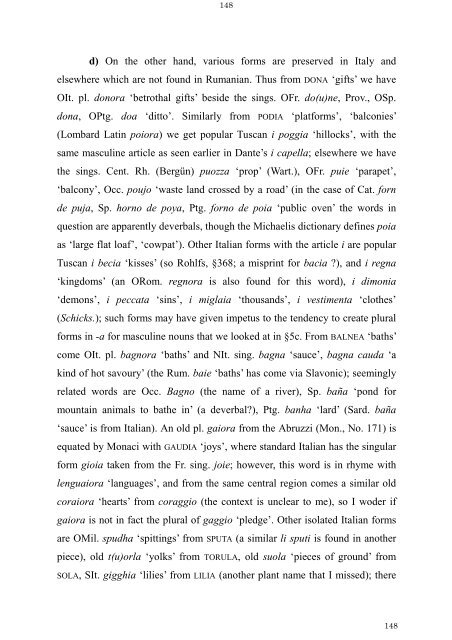The Latin Neuter Plurals in Romance - Page ON
The Latin Neuter Plurals in Romance - Page ON
The Latin Neuter Plurals in Romance - Page ON
Create successful ePaper yourself
Turn your PDF publications into a flip-book with our unique Google optimized e-Paper software.
148<br />
d) On the other hand, various forms are preserved <strong>in</strong> Italy and<br />
elsewhere which are not found <strong>in</strong> Rumanian. Thus from D<strong>ON</strong>A ‘gifts’ we have<br />
OIt. pl. donora ‘betrothal gifts’ beside the s<strong>in</strong>gs. OFr. do(u)ne, Prov., OSp.<br />
dona, OPtg. doa ‘ditto’. Similarly from PODIA ‘platforms’, ‘balconies’<br />
(Lombard <strong>Lat<strong>in</strong></strong> poiora) we get popular Tuscan i poggia ‘hillocks’, with the<br />
same mascul<strong>in</strong>e article as seen earlier <strong>in</strong> Dante’s i capella; elsewhere we have<br />
the s<strong>in</strong>gs. Cent. Rh. (Bergün) puozza ‘prop’ (Wart.), OFr. puie ‘parapet’,<br />
‘balcony’, Occ. poujo ‘waste land crossed by a road’ (<strong>in</strong> the case of Cat. forn<br />
de puja, Sp. horno de poya, Ptg. forno de poia ‘public oven’ the words <strong>in</strong><br />
question are apparently deverbals, though the Michaelis dictionary def<strong>in</strong>es poia<br />
as ‘large flat loaf’, ‘cowpat’). Other Italian forms with the article i are popular<br />
Tuscan i becia ‘kisses’ (so Rohlfs, §368; a mispr<strong>in</strong>t for bacia ?), and i regna<br />
‘k<strong>in</strong>gdoms’ (an ORom. regnora is also found for this word), i dimonia<br />
‘demons’, i peccata ‘s<strong>in</strong>s’, i miglaia ‘thousands’, i vestimenta ‘clothes’<br />
(Schicks.); such forms may have given impetus to the tendency to create plural<br />
forms <strong>in</strong> -a for mascul<strong>in</strong>e nouns that we looked at <strong>in</strong> §5c. From BALNEA ‘baths’<br />
come OIt. pl. bagnora ‘baths’ and NIt. s<strong>in</strong>g. bagna ‘sauce’, bagna cauda ‘a<br />
k<strong>in</strong>d of hot savoury’ (the Rum. baie ‘baths’ has come via Slavonic); seem<strong>in</strong>gly<br />
related words are Occ. Bagno (the name of a river), Sp. baña ‘pond for<br />
mounta<strong>in</strong> animals to bathe <strong>in</strong>’ (a deverbal?), Ptg. banha ‘lard’ (Sard. baña<br />
‘sauce’ is from Italian). An old pl. gaiora from the Abruzzi (Mon., No. 171) is<br />
equated by Monaci with GAUDIA ‘joys’, where standard Italian has the s<strong>in</strong>gular<br />
form gioia taken from the Fr. s<strong>in</strong>g. joie; however, this word is <strong>in</strong> rhyme with<br />
lenguaiora ‘languages’, and from the same central region comes a similar old<br />
coraiora ‘hearts’ from coraggio (the context is unclear to me), so I woder if<br />
gaiora is not <strong>in</strong> fact the plural of gaggio ‘pledge’. Other isolated Italian forms<br />
are OMil. spudha ‘spitt<strong>in</strong>gs’ from SPUTA (a similar li sputi is found <strong>in</strong> another<br />
piece), old t(u)orla ‘yolks’ from TORULA, old suola ‘pieces of ground’ from<br />
SOLA, SIt. gigghia ‘lilies’ from LILIA (another plant name that I missed); there<br />
148









